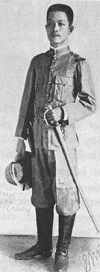
The War for Cuban Independence
by Jerry A. Sierra
Intro | Before The
War | The War Begins | U.S.
Intervention | After The War |
Sidebars: Frederick
Funston, American Insurrecto | Funston
meets Gómez |
Spanish-Filipino-American War |
An Excerpt from Mark Twain |
A
Poem: "Cuba Libre" | References
Sidebar:
The Spanish-Filipino-American War

McKinley's re-election campaign of 1900 asserted that "our authority could not be less than our responsibility, and whatever sovereign rights were extended it became the high duty of the Government to maintain its authority, to put down armed insurrection and to confer the blessings of liberty and civilization upon all the rescued peoples." This, supposedly, gave us the moral "responsibility" to "uplift and civilize" the Filipinos.
The Filipino rebels, who had also engaged Spain in a war of independence, were led to believe that U.S. forces were there to help them. According to record, they were allowed to believe this until the last possible second, when U.S. interests announced themselves as the new masters.
In what became known as the Treaty of Paris, on December 10, 1898, Spain gave up all claims to Cuba, Puerto Rico and Guam, and received $20 million for the Philippines, ending the war.
Following the peace agreement with Spain, the U.S. began to assert its authority over the Philippines. Feeling betrayed, the Filipinos revolted against their new landlords under the leadership of Emilio Aguinaldo in February of 1899. It took U.S. forces three years to "pacify" the rebels. On March 6 1901, General Frederick Funston captured Aguinaldo at his secret hideaway. In the U.S. the war became very unpopular because of the racist campaign conducted against the "brown-skinned Oriental Filipinos," who were also called "niggers."
Despite widespread criticism against this war (which was labeled
an "insurrection" by pro-expansionist media), the U.S. was determined to keep
the islands, which were ripe with natural resources, and offered a foot in the
door to markets in China and Japan.
The "Teller Amendment," which protected Cuba from U.S. colonization, did not apply to the Philippines.
Next: Sidebar 2